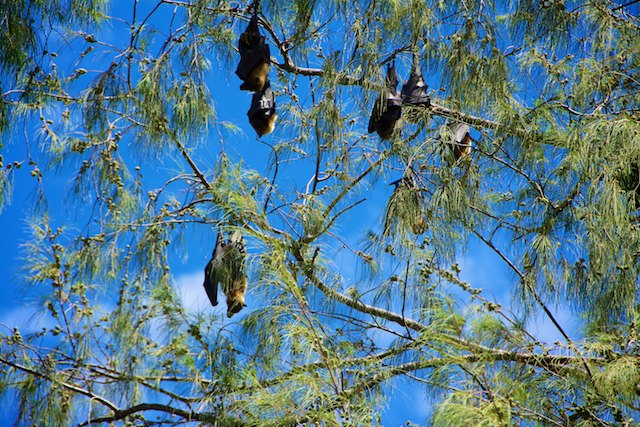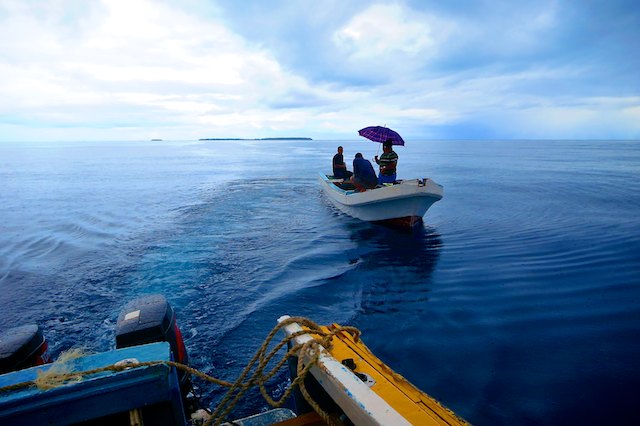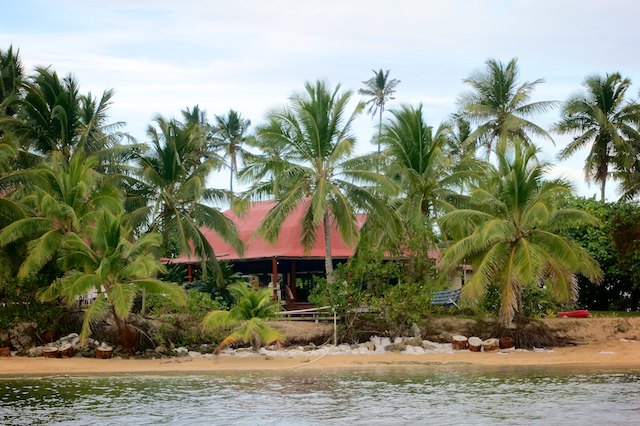Dateline: Tonga
Oh, good lord. How many mosquito bites can one girl get? This about mosquitos and Tonga: two applications of industrial strength DEET and the bastards are still biting me through my clothes. (These intrepid insects put me in mind of their brethren of North America. Michigan state to be specific, where on a bike ride in St. Joes I once watched the MI variety bite (me) through my bike shorts! Through Lycra for crissakes!)
Someone, perhaps an expert in entomology, please inform: are these winged demons not creatures of hell itself? What earthly purpose do mosquitos serve anyway? Food for the bats, I’m going to tender an uneducated guess, just based on the prodigious size of the local bat community here on this tiny little island. And I mean both the size of the population in terms of numbers AND in terms of individual size as well. Biggest bats you’ve ever seen. (Biggest bats I’ve ever seen.) Wing span about 25 inches give or take. Big mothers.
See for yourself in this photo from our tour of the main island of Tongatapu. I guess they get that big because they are feasting on all the gd mossies. (FYI “mossies” is island speak for mosquitos, as if the local folk are fond of the useless mofos. Me? I do not use a sweet-sounding diminutive for a creature you can barely see yet a single one has the power to keep you up all night long scratching like a meth addict.) Sorry about the blue language. Sleepless bug-ridden nights make me sort of techy. Yes, you might be of the opinion that a bat-filled tree shouldn’t really qualify as an E-ticket attraction on a national tour, but honestly it was kind of great. Not killer whales great, or herds of elephants great, but somehow reassuring that somebody out there is devouring those goddamned mosquitos by the gajillions.
One of the truisms (and sometimes an advantage) of traveling on the “shoulder” season, especially at the end of the “high” season, is that things are quite a bit more relaxed in general in tourist destinations. Things and personnel. You should expect for instance that facilities will sometimes display a bit of delayed maintenance here and there. At most tourist hot spots there are fewer travelers around (a good thing for the most part), but that can mean a reduction in staff and in some cases a reduction in service. Not a big deal if you’re talking about menu selections, (“Sorry, but we are all out of everything on the menu except the local grilled fish and roasted breadfruit for the foreseeable future, i.e. the duration of your stay.”), but a very big deal if you’re talking about a break down of your twin engine motorboat transport from Atata to Nuku’alofa, Tongatapu when headed for your return flight back to Fiji.
When it comes to ocean going voyages, word of imminent disaster spreads very quickly on a motorboat that is about the size of my hot tub in Oak Park. Picture me and Pablo (and five Tongans), mid-Pacific, down one engine, and the other one starts to whine like I’ve been known to when the chardonnay isn’t cold enough. All of the adult Tongans (there is one baby aboard) are talking loudly and excitedly on five different cell phones. (To whom they are all speaking is a question that we will not think to ask, nor will we ever find out an answer.) The only word I can make out for sure is “Americans”. There is no laughter on board our crippled vessel. This one thing is true when it comes to the people of Tonga. If nobody’s laughing, it’s time to worry. Anxiety is highly contagious on a small boat. Our anxiety was (stupidly) about missing our flight. The Tongans, it was to be revealed, were much more concerned about losing the one remaining sickly motor completely and drifting into the reef where the rocky shoals would surely punch a hole in the bottom of the boat. (During the crossing, the “captain” – a barefoot teenager – steers with one foot while standing up on the seat to look out for hole-punching rocks sticking up out of the sea. This should have been a clue to our imminent peril, but alas, or maybe luckily, depending on your preferences, we were clue-LESS about this particular hazard on every one of our four passages.) Eventually it was conveyed to us that the “engineer” was on his way out from where we had only just deported, to reconnoiter and “repair” the engine. The “engineer” is the one guy on the island who can repair anything, and he does. He is the plumber, (fixer of toilet stoppages and leaks), the electrician, (fixer of ceiling fans) and now the nautical engineer, (boat fixer). He caught up with us in another boat (this one the size of a large-ish bathtub) and after a hasty discussion, which included all highly agitated Tongans, one of the girls abruptly decamped to the smaller vessel with all of her luggage and a few other leaking parcels containing fish. I supposed that they were reducing the load in our boat to prevent us from sinking but, and not for the first time, I supposed wrong. Part of the Tongan’s concern (the lion’s share, I might add) was the concern that our evacuee was going to miss her ferry to another small island. That was the real crises among our fellow passengers. Secondary was the issue of the Americans and their silly itinerary.
So, as the “rescue” vessel steered toward the mainland with haste, one rather hefty young Tongan woman standing mid-ship holding aloft an umbrella – did I mention it was pouring down raining? – I did have to fall in love with the Tongans (again) a little bit for the obvious deep concern that they feel for one other. It is a co-operative culture, demonstrably communal, and like many of the countries of the African diaspora, it truly feels “all for one and one for all”.
The boat transporting the Americans followed behind, limping into harbor a little late, but well within time to catch our last Tongan meal at the very wonderful Friends Café and also in time for a whole other adventure which can be summed up thusly: Why Leaving Your Luggage in the Back of a Taxi in Tonga to go Toddling off in Search of Cappuccino is A VERY BAD IDEA.


